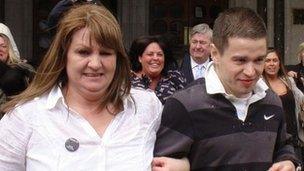Sam Hallam murder conviction quashed by Court of Appeal
- Published
Sam Hallam: "I had to just get on with it day to day"
A man who served more than seven years in jail for a murder he always denied has had his conviction quashed.
Sam Hallam, now 24, was jailed in 2005 for a minimum of 12 years over the death of Essayas Kassahun, 21, in Clerkenwell, central London, in 2004.
The Court of Appeal, which had heard photographs on Mr Hallam's mobile phone could have helped his defence case, ruled his conviction was "unsafe".
He said: "I don't want anyone else ever to suffer what I've been through."
The court's judges said that for "reasons that escape us", two telephones in Mr Hallam's possession at the time of his arrest were not investigated by the police or his then defence team.
There was a failure by police to investigate his alibi, and witnesses who put him at the scene of the murder were unreliable, the court heard.
'Time to recover'
Fresh material in the case included evidence from an acquitted co-accused who said Mr Hallam was not present at the scene and post-trial evidence from Mr Hallam's mobile telephone which showed his true whereabouts on the evening of the crime.
In a statement read outside court by Paul May, who led the campaign to free him, Mr Hallam added: "The identification evidence against me was so unreliable it should have never been put to the jury.
"The Metropolitan Police should have followed up leads which would have proved my innocence of the terrible murder of Essayas Kassahun.
"They should have disclosed all the relevant evidence in their possession to my lawyers and they didn't.
"I now need time to recover with my family and friends from the nightmare I've suffered for the last seven-and-a-half years.
"Justice has long been denied to me but it has now finally prevailed."
Mr Hallam, who lost a conviction appeal in 2007, also thanked the Criminal Cases Review Commission and Thames Valley Police for the "thorough investigation" they carried out into his case.
He was released on bail by the Court of Appeal on Wednesday after prosecutors said they would not oppose his appeal.
Lady Justice Hallett, who delivered the court's judgement, said Mr Hallam's "inability or unwillingness" to say where he was at the time of the murder had "not exactly helped his case".
But she added: "Given the attachment of young people and the more mature to their mobile phones, we can't understand why someone, either from the investigating team or the defence team, did not think to examine the phones attributable to the appellant.
"Given our limited knowledge, we would have thought that, even a cursory check would have produced some interesting results.
"Further, we would have thought the appellant would have alerted the defence team that he had been taking photos on a new phone which would have helped establish his whereabouts."
'Deep regret'
Lady Justice Hallett also told the court that one eyewitness account had been a "fleeting glimpse" and there was scope for mistaken identity.
"We now have therefore the real possibility that the failed alibi was consistent with faulty recollection and dysfunctional lifestyle and not a deliberate lie."
She said: "In our judgment, the cumulative effect of these facts is enough to undermine the safety of these convictions."
A spokeswoman for the Crown Prosecution Service (CPS) said the decision to prosecute had been made on the evidence then available, including from eyewitnesses.
She said: "In its judgment, the Court of Appeal did not criticise the CPS for bringing the prosecution.

Sam Hallam left the Court of Appeal on Wednesday with his mother Wendy
"It is now clear that there was other evidence which, in the Court of Appeal's view, has undermined the safety of the conviction of Sam Hallam."
Mr Hallam, of Hoxton, east London, was 18 when he received a life sentence for the murder of trainee chef Mr Kassahun, who died after being stabbed in the head during an attack by a group of youths on the St Luke's estate in October 2004.
At the trial the following year, Mr Hallam and Bullabek Ringbiong, then 20, from Hoxton, were both jailed for murder.
Scott White, 17, also from Hoxton, was convicted of conspiracy to cause grievous bodily harm and was sentenced to eight years' youth detention. In total, six people went on trial for the killing.
Since his conviction, Mr Hallam's family and friends have waged a high-profile campaign for justice, with supporters including actor Ray Winstone, who has criticised the police's handling of the case.
The Metropolitan Police said it was "a matter of deep regret that Sam Hallam lost his liberty" due to an unsafe conviction.
Commander Simon Foy, head of the Homicide and Serious Crime Command, said: "The death of Essayas Kassahun was a tragedy and what followed was a complex investigation for which one person remains convicted."
He said the circumstances of the crime involved a large group of people and this type of investigation often relied on people coming forward to give personal accounts.
He added: "We continue to face challenging investigations such as these and there are undoubtedly certain lessons to be learned for police and the wider criminal justice system from today's judgement."
- Published17 May 2012
- Published16 May 2012
- Published16 May 2012
- Published16 May 2012